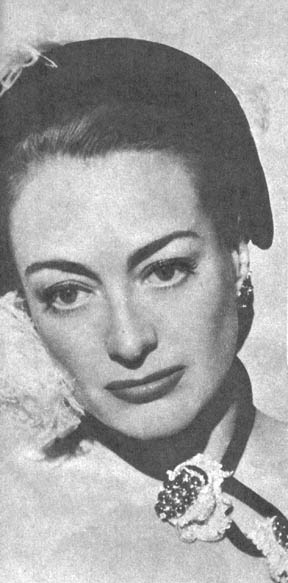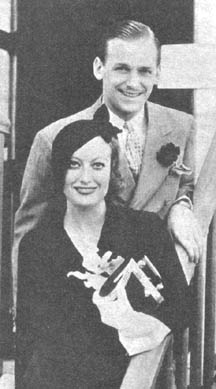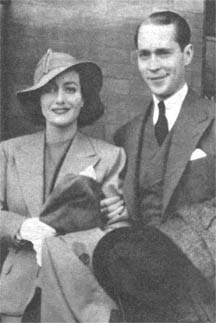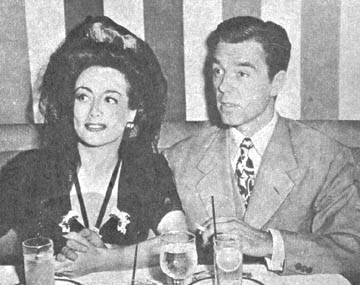To Have and Have Not
There's a
reason why Joan Crawford hasn't found enduring love...
and we believe this is
it
by Kolma Flake
Originally appeared in Motion Picture, June 1950
 No
Hollywood actress is as synonymous with glamor and excitement as Joan Crawford.
None is more delightful to be with; none more democratic or generous. There is
no other star whose beauty has so increased, who has exhibited more expansion
intellectually or artistically.
No
Hollywood actress is as synonymous with glamor and excitement as Joan Crawford.
None is more delightful to be with; none more democratic or generous. There is
no other star whose beauty has so increased, who has exhibited more expansion
intellectually or artistically.
Yet Joan has obviously missed lasting love.
This puzzles everyone -- her fans, her friends and acquaintances and even her three ex-husbands: Douglas Fairbanks, Jr., Franchot Tone and Phil Terry. People who talk to them are impressed by the genuine affection, admiration and concern they express for her. No taint of that friendly-after-divorce bromide creeps into their words.
So what goes on and why?
Some stoutly maintain there's no man who can match Joan's tremendous capacity to live and to give. That may be true. Someone suggests that she is one of the few women in whom the achievement ego seems to be stronger than the need for love. "Not," that person adds quickly, "that love isn't as important to her as most women. Just that achievement is even more important."
A thoughtful person must wonder if that isn't the more factual answer.
Tracing the pathway of some of Joan's outstanding romances, there seems to be a pattern which bears that statement out. She is deeply devoted to her first beau, Ray Sterling, who, incidentally, has never married. A successful Florida businessman, he has carried on an affectionate correspondence with her for many, many years. Probably more than anyone else, he knows and understands her.
"He was my first friend," Joan says again and again. "I met him at a college dance in Kansas City when I was only 13. I wore cheap, exaggerated clothes. I used so much make-up trying to look older I suspect I looked cheap and tough. My only happiness was dancing."
 |
| Doug Fairbanks, Jr. ... husband...still greatly admires Joan Crawford |
A strange one to be attracted to Billie Cassin, as Joan was known then -- a kid whose background was one to make her understandably mistake the gaudy glitter and excitement of carnivals for real beauty and real living.
But there was something about Billie! Something to make him feel strongly that someday she would be somebody and that nothing or no one should stand in her way. He gave his belief to her, taught her much and encouraged her to believe in herself. When she broke away from her early background, he saw her off. His affectionate and confident letters sustained her during the sordid hall-bedroom hours she knew as a chorus girl in Chicago, Detroit and New York. Lonely hours they were, too.
Joan says now, "The happiest off-stage moments of those days were when Jack Oakie (then a chorus boy in the same New York show) took me window-shopping where only the wealthy can afford to buy. When I would say, confidently, that some day I'd be able to walk in and buy whatever I wanted there, Jack would boom with certainty, 'You betcha!' "
This is quite a revelation of that achievement ego, isn't it?
Her first few months in Hollywood were in many respects disappointing and unrewarding. She makes no bones about how Ray's confident letters again sustained her.
Then the pattern seems to break for awhile. She had a crush on Mike Cudahy, the playboy son of a wealthy meat packer. Joan says she enjoyed lecturing him on wasting his life at play. Examining that period, we notice that he took her to the night spots where Charleston contests were the vogue. Becoming a champion, as she did, in a town where talent abounds, must have been a great satisfaction to that dominant ego.
As Douglas Fairbanks, Jr. enters the picture, you wonder how much she confused him with Ray Sterling. They both made her believe she could make up for the good background she'd missed. They both were serious students of the intellectual and artistic fields.
 |
| Franchot Tone. ... husband...still greatly admires Joan Crawford |
Franchot Tone inspired her with confidence on two scores: that she could achieve a successful marriage despite one failure, and that she could act before live audiences -- something which scared her. As they studied seriously together to make the latter possible, their marriage seemed sound. Teacher Franchot succeeded in giving her the confidence to appear on a few live radio shows. But the teacher-pupil relationship strained under the handicap of teacher playing second, professionally, to his pupil. Again Joan was in the divorce court. Again she emphatically stated marriage was not for her.
Three years later she astounded Hollywood by marrying Phil Terry, an ambitious young actor. He's somewhat of a puzzle in the pattern, especially as Joan is not as articulate about him as her other husbands. At the time of her marriage, she said, "He's the kindest person I've ever met."
It seems now that he convinced her a successful marriage was possible if... So she stressed that she was Mrs. Phil Terry. So much so that interviewers found themselves interviewing him, with Joan throwing in only a few polite wifely words. But she was trying the impossible for a woman with her achievement ego: to make Mrs. Phil Terry a more important name than Joan Crawford.
The long and final illness of Phil's father caused him to interrupt his motion picture career to take over his parent's business affairs. During this time it's possible that Phil found himself happier as a businessman than as an actor. It's quite likely he decided then to leave Hollywood. If so, he bumped up against his wife's ego at the worst possible time.
Joan was experiencing the agonies of being called a "has been." She makes no bones about that being the worst three years of her life. She hates failure in any form, big or small. She and Phil ended their marriage just before she won the Academy Award for Mildred Pierce, which put her smack up on top of the big league again.
 |
| At first it seemed that Joan's third husband, Phil Terry, would change her views on marriage |
But marry him? Joan says, "Marriage wasn't for us. We're no good for each other." Note she said "us" -- not "me" as so emphatically she has said in the past.
The pattern was beginning to change.
Today, she's a successful mother of four devoted adopted children. She's a mother having a whale of a time -- a mother who for the first time is sharing the happy childhood she missed herself.
You can see Joan far more relaxed, shining with added self-confidence. Things aren't so "do or die" with her. She can even laugh when asked if it isn't true she once thought she'd rather have success than love. She admits, "I used to think that but I don't any more."
A new romance?
"None," she insists.
Marry again?
"Maybe," Joan smiles warmly, as though that might be a good idea.
When a woman nightly tucks four loving children into bed, she should have a much-loved and loving husband to achieve perfect personal happiness. Joan must know that. And now that she has achieved everything else a woman could possibly want, we're willing to wager her very will to succeed, plus the wisdom brought on by the years, will lead her to a safe matrimonial path.